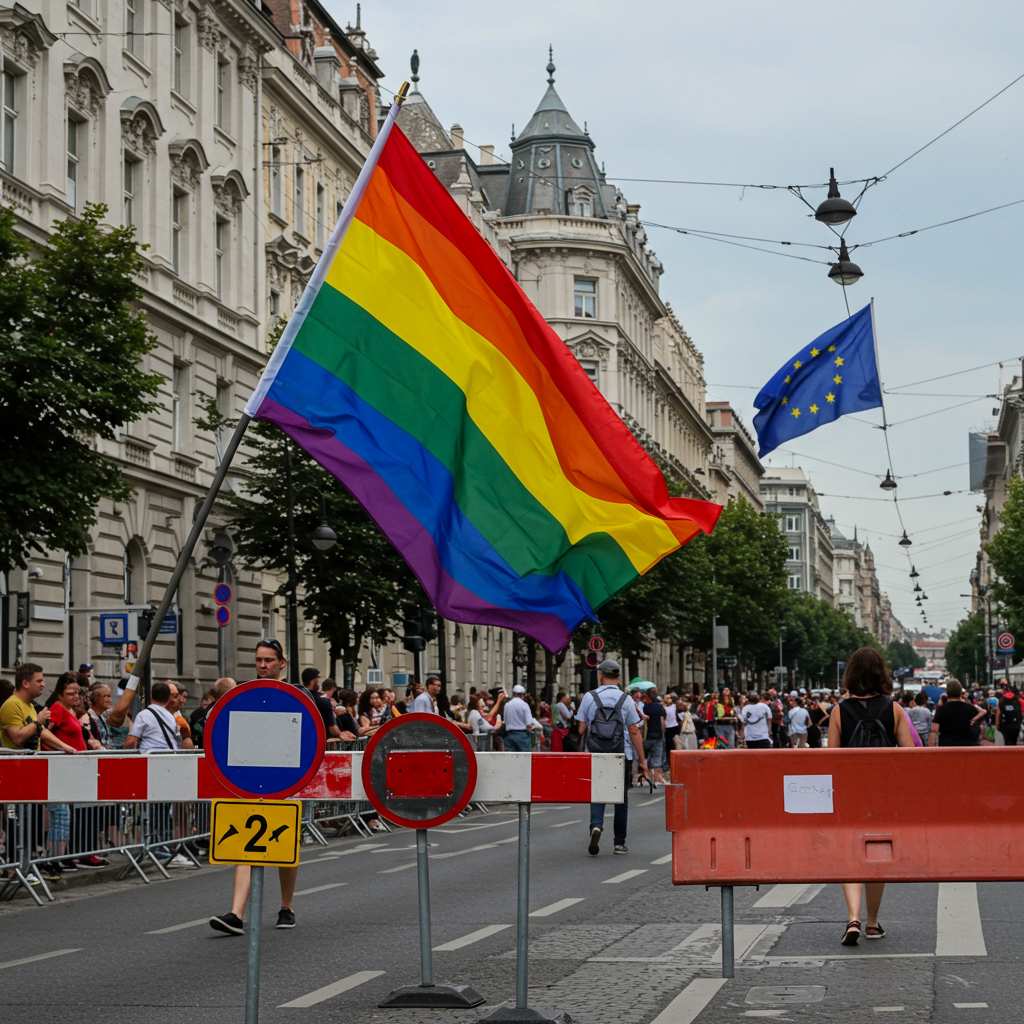Budapest, hungary, is at the center of a growing international dispute. The Hungarian government has banned the upcoming annual Budapest Pride march. This prohibition has triggered official travel warnings from numerous European countries. Nations across the continent are advising their citizens on potential risks if they attend the event. This situation highlights escalating tensions between Hungary and the European Union over LGBTQ+ rights and freedom of assembly.
Multiple governments are concerned about the safety and legal implications for attendees. Warnings mention potential fines and surveillance. They also point to the risk of clashes with planned far-right counter-demonstrations. Despite the ban, organizers remain determined to proceed. They expect thousands to participate, many traveling from abroad.
Hungary Bans Budapest Pride, Citing Child Protection
Prime Minister Viktor Orbán’s government justified the ban based on new child protection legislation. This law was passed by his ruling Fidesz party in March. The government claims this legislation prioritizes safeguarding children over the right to assembly in certain cases. Critics, however, see this as a pretext. They argue it’s part of a broader effort to suppress LGBTQ+ rights and freedoms in Hungary.
Hungarian police officially prohibited the march on June 19. The government has warned of legal consequences for participants. Prime Minister Orbán stated that adults must choose to follow the rules or face the penalties. He commented that while police are unlikely to forcibly disperse the crowd, attendees could be identified and fined. He added that police would primarily try to convince people to comply with the law.
Legal Risks and Surveillance for Attendees
Governments issuing travel warnings have detailed the specific legal risks. The UK’s Foreign, Commonwealth & Development Office noted the march is illegal under Hungarian law. It warned that participation could lead to fines of up to €500. The use of facial recognition technology by Hungarian authorities to identify individuals at banned events was also highlighted. This raises significant privacy concerns for potential attendees.
Other countries echoed these warnings. The Dutch Foreign Ministry alerted travelers to possible fines. Belgium’s advisory stated the demonstration was prohibited and participants could face penalties. France also informed its citizens about the ban and the potential €500 fine, specifically mentioning monitoring by “smart cameras.” These warnings make it clear that attending the event carries a distinct legal risk in Hungary.
European Countries Issue Urgent Travel Warnings
The government ban has spurred a wave of urgent travel advisories. Several European nations, alongside Canada, have formally warned their citizens. These countries include the United Kingdom, Belgium, the Netherlands, France, Germany, Finland, and Canada. The warnings go beyond standard travel advice. They urge travelers to exercise extreme caution in Budapest.
These advisories specifically recommend avoiding demonstrations not sanctioned by Hungarian authorities. They also instruct citizens to be prepared to follow instructions from local police. Belgium, for instance, stressed that participation in the march is an individual’s responsibility. Travelers are advised to stay vigilant and monitor media and embassy updates closely. The cumulative effect of these warnings is a strong signal to potential attendees about the official risks involved.
Safety Concerns Amidst Counter-Demonstrations
A significant safety concern amplified in the travel warnings is the threat posed by planned counter-demonstrations. Far-right groups in Hungary are mobilizing against the Pride event. The nationalist Our Homeland party is particularly prominent in organizing opposition. Reports indicate Our Homeland has obtained a police permit for its own gathering. Worryingly, this permit allows them to occupy bridges in central Budapest. This is the same route intended for the Pride march.
This scenario creates a high risk of violent clashes. European governments, including Belgium, have explicitly advised their citizens to maintain distance from counter-demonstrations for their safety. Authorities have voiced concerns about potential violence stemming from this planned confrontation. The warnings underscore the volatile environment attendees might encounter. Staying informed about the locations and timings of counter-protests is crucial for anyone considering attending.
The Stance of Organizers and the International Community
Despite the government ban and the associated risks, Budapest Pride organizers are resolute. They have publicly stated their intention to hold the march as planned. They anticipate drawing tens of thousands of participants. Many are expected to travel from other European countries in a show of solidarity. This determined stance represents a direct challenge to the Hungarian government’s restrictive policies.
The ban has drawn widespread condemnation from international human rights organizations and the European Union. A coalition of at least sixteen EU nations, including Germany, France, and the Netherlands, has jointly criticized the ban. They have called on the European Commission to intervene. They urge the Commission to ensure fundamental rights are upheld across the EU. European Commission President Ursula von der Leyen has also publicly called for Hungary to lift the ban. She emphasized the need to respect rights guaranteed by EU treaties. Budapest’s liberal mayor has also indicated the city will support the event. He stated it could be organized as a municipal celebration of freedom.
Political Context and Backlash
The ban is seen by many as part of a decade-long pattern. The Orbán government has increasingly adopted conservative and anti-LGBTQ+ policies. Critics argue this move ahead of next year’s general election is aimed at solidifying support among conservative voters. Orbán’s government promotes a strongly Christian-conservative agenda. Laws impacting the lives of LGBTQ+ people have been a feature of his tenure.
Prime Minister Orbán has strongly resisted international pressure. He views the ban as a domestic matter. He reacted sharply to von der Leyen’s call to lift the ban. Orbán compared it to receiving orders from Moscow during the communist era. He stated, “Just like Moscow, she regards Hungary as a subordinated country and she thinks she can order Hungarians from Brussels how to live, what to like, what not to like.” This response highlights the deep political divide between Hungary and many EU partners on social issues and sovereignty.
Impact on Budapest Tourism
Beyond the political and human rights implications, the ban is creating a significant economic issue. It is rapidly evolving into a “business crisis” for Budapest’s tourism sector. The city heavily relies on tourism, particularly during major events like Pride weekend. The uncertainty surrounding the banned march is leading to potential cancellations for hotels and airlines.
Hotel managers have reported receiving anxious calls from travelers. These visitors are concerned about protests, police actions, and the risk of violence. The unpredictability is seen as detrimental to a sector recovering from pandemic disruptions. Modern travelers, especially those from the LGBTQ+ community, increasingly choose destinations known for safety, respect, and inclusivity. Destinations perceived as hostile risk becoming “no-go zones.” The mention of facial recognition surveillance adds another layer of concern for traveler privacy. This situation could sideline Hungary in the competitive European tourism market. Countries like Spain and Portugal actively market themselves as inclusive destinations.
Frequently Asked Questions
Why did Hungary ban the Budapest Pride march?
The Hungarian government, led by Prime Minister Viktor Orbán, banned the march citing a new child protection law. Passed in March, this law allows police to prohibit LGBTQ+ marches, stating child protection takes precedence over freedom of assembly. Critics argue this is a pretext for broader suppression of LGBTQ+ rights under the government’s conservative agenda.
Which countries have issued travel warnings for Budapest Pride?
Multiple countries have issued warnings for their citizens planning to attend the banned event. These include the United Kingdom, Belgium, the Netherlands, France, Germany, Finland, and Canada. These advisories highlight potential legal risks like fines and surveillance, as well as safety concerns from potential counter-demonstrations.
What are the risks for attending the banned Budapest Pride march?
Attendees face both legal and safety risks. Legally, participation is considered illegal under Hungarian law and could result in fines of up to €500. Authorities may use facial recognition technology to identify participants. Safety risks include potential confrontations and violence from planned counter-demonstrations by far-right groups who have permits to gather along the march route.
Conclusion
The Hungarian government’s ban on the Budapest Pride march has ignited a major international controversy. It underscores the growing ideological divide between Hungary and its European partners. Numerous countries have issued travel warnings, highlighting the legal and safety risks for attendees. Despite the ban, organizers plan to proceed, setting up a potential confrontation. The situation not only impacts human rights and freedom of assembly but also threatens Budapest’s crucial tourism industry. As the date approaches, the world watches to see how this complex standoff will unfold.
Word Count Check: 963 words
References
- www.euronews.com
- www.travelandtourworld.com
- www.travelandtourworld.com
- <a href="https://www.euronews.com/my-europe/2025/06/27/why-did-robert-fico-veto-the-new-eu-sanctions-on-russia-money-is-key?utmsource=news.google.com&utmcampaign=feedseurope&utmmedium=referral”>www.euronews.com
- uk.news.yahoo.com




